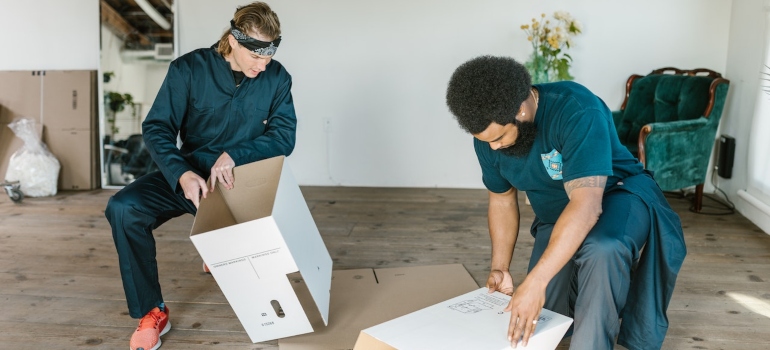Protect Your Personal Information During a Move
Moving to a new home is a complex process that involves more than just packing and unpacking—it’s a significant life event filled with logistical challenges and potential risks, particularly to your personal information. Why is it important to protect your personal information? As you transition from one place to another, your sensitive data becomes vulnerable to theft and misuse. Identity thieves often target individuals during moves, capitalizing on the chaos and potential oversights. Protecting your personal information during a move is not just advisable; it’s essential. In this article, our Seattle movers advise you on how to protect your personal information, ensuring a secure move and peace of mind in your new home.
What Can You Do to Protect Your Personal Information
With all the chaos that comes with moving, it’s easy to overlook the security of your personal information. But how can you protect your personal information? Here are several essential steps that you can take to ensure your personal data remains secure from the planning stage through to settling into your new home:
- Submit an address change early;
- Notify all important parties in a timely manner;
- Select a trustworthy moving company;
- Take inventory of your important items;
- Personal transport of sensitive items;
- Shred unnecessary and old documents;
- Be present during the move;
- Limit disclosure of moving details;
- Update software and security measures;
- Secure all devices with GPS abilities.
After you have these proactive steps in place, continue to stay vigilant. Ensure that all communication regarding your move, especially those involving sharing your new address and personal details, is done securely. Use these strategies both as a checklist and a foundation for maintaining the privacy and security of your personal information throughout the moving process.
Early Submission of Your Address Change
Initiating your address change with the USPS well before your move is crucial for safeguarding your personal details. Begin this process at least two weeks in advance to ensure your mail is rerouted to your new address right when you arrive, preventing sensitive documents from falling into the wrong hands. You can submit your change of address online, at your local post office, or via a mail-in form. This preemptive step is vital for avoiding mail misdelivery, which can expose your personal information to potential identity theft.
Furthermore, timely updating your address with the USPS helps mitigate risks associated with delayed or lost correspondence, including financial statements and personal letters. This early adjustment provides a buffer period during which you can resolve any issues with mail forwarding and ensures a seamless transition of your mail flow. If you’re proactively managing your address change, you also maintain control over your personal information, reducing the likelihood of it being accessed by unauthorized parties during the chaotic moving process.

Informing Essential Contacts of Your New Address
As you embark on your move, it is essential to notify all relevant institutions of your new address to maintain continuity in services and protect your personal information. Make sure to update your address with financial institutions, insurance providers, utility companies, and educational bodies. Most organizations offer the convenience of updating your information online, ensuring a quick and secure transition. This step is crucial for smooth service and the security of sensitive information that might otherwise be sent to your old address.
Additionally, systematically informing these entities helps avoid potential disruptions in services such as banking, insurance claims, and utility provisions, which could complicate your move. It also prevents any personal data exposure through documents sent to an old address. Keeping all relevant parties informed of your whereabouts safeguards your personal information and aids in the smooth re-establishment of your life at your new residence, making your transition as stress-free as possible.
Choosing a Reliable Moving Company
Selecting a trustworthy moving company is vital for the safe handling of your belongings and personal information. Ensure that the movers are licensed and insured, and check their credentials with the Federal Motor Carrier Safety Administration (FMCSA). A valid U.S. Department of Transportation number clearly indicates a legitimate service. You should also solicit recommendations from friends and read online reviews to assess the company’s reputation. A reliable mover guarantees the safety of your physical items and the security of any personal data they might handle.
Engaging several moving companies for on-site estimates is also a prudent approach. This allows you to compare services, prices, and the professionalism of each company in person. Asking detailed questions during these evaluations can provide insights into how each company manages security and handles personal information. Choose a company that demonstrates a strong commitment to customer privacy and has robust measures in place to prevent data breaches during the moving process.
Detailed Inventory Management
Creating a detailed inventory of all items you need to move is crucial for tracking your belongings and ensuring nothing is misplaced or stolen during the transition. List each item, particularly those containing sensitive information, and keep this inventory handy throughout the move. This record will help in monitoring the loading and unloading process by your Washington movers and serve as a valuable document for insurance purposes in case of loss or damage.

Maintaining a detailed inventory also assists in organizing and unpacking your items once you reach your new home. Knowing exactly what you have and where each item should go can significantly streamline the setup of your new space. Additionally, should any disputes arise with the moving company about the state of your goods, your inventory provides a clear reference point to facilitate resolutions and ensure you get appropriate compensation.
Personal Handling of Sensitive Documents
Ensuring the safety of crucial documents such as birth certificates, passports, and financial records is critical during a move. To prevent these items from being lost, stolen, or mishandled amidst the moving chaos, it is advisable to carry them personally. Whether you are traveling by car or airplane, keep these documents in your personal vehicle or carry-on luggage. This direct oversight guarantees that sensitive information remains secure and accessible throughout the transition process.
Carrying important documents with you also allows for immediate access when you need to verify your identity or handle urgent administrative tasks. This accessibility is particularly beneficial when settling into your new home or handling unexpected requirements. For example, having your identification documents handy can facilitate the setup of new utility accounts or services without delay. It’s also a preventive measure against the common pitfalls of moving, such as misplacing or misdirecting items during the shuffle.
Secure Disposal of Unwanted Documents
As you prepare for relocation with your chosen local movers in Seattle, take the time to sift through and securely dispose of old documents containing personal information. Shredding is the most effective way to ensure that no one uses these documents for identity theft. For households with a significant amount of sensitive paperwork, investing in a cross-cut shredder offers a higher level of security, as it cuts papers into confetti-like pieces, making them nearly impossible to piece back together.
Moreover, if the volume of sensitive documents is too large for personal shredding, employing a professional shredding service is a wise choice. These services efficiently destroy large quantities of documents and often provide a certificate of destruction for your records, adding an extra layer of security and peace of mind.
Also, ensure complete destruction of outdated financial records, personal identification documents, and other sensitive information. It helps maintain your privacy and safeguard against potential identity theft from improperly disposed personal data during your relocation.

Be Present During the Move
Being actively present during the move is crucial to ensure that all your belongings are handled securely and according to your instructions. Supervising the loading and unloading process allows you to monitor how movers handle each item, especially those containing personal or sensitive information. This oversight helps prevent damage and loss, giving you the opportunity to intervene if necessary.
Additionally, being on-site during the move ensures that movers can make any immediate decisions or adjustments quickly. This is particularly important for organizing which items professional residential movers load first and how they arrange them in the moving truck. It also allows you to provide direct feedback and specific instructions to the movers.
It can prevent misunderstandings and errors in handling your belongings. Your involvement in the process protects your items and helps ensure that the move progresses smoothly and efficiently, reducing stress and increasing your confidence in the security of your possessions.
Limit Disclosure of Moving Details
When preparing for a move, it’s essential to be mindful of the information you share publicly. Revealing details about your moving dates or your new address on social media platforms or in public forums can make you a target for identity thieves and burglars. These individuals often use such publicly accessible information to plan their crimes, including theft and fraud.
To protect your personal information and yourself, keep details of your move as private as possible. Only share specifics with trusted friends and family, and avoid posting any information about your move on social media until after you securely settle in your new home. If you need to communicate details related to the move, consider using private messages or direct communication methods like phone calls or emails.
Update Software and Security Measures
Ensure that all software on your electronic devices is up-to-date, especially during a move when your devices are more vulnerable. Before relocating, take the time to check for and install updates on all your devices, including computers, smartphones, and tablets. These updates often include critical security patches that protect against new vulnerabilities, which can be crucial as your devices may connect to various new networks while moving to Seattle and encounter different threats in transit.

Additionally, ensure that all security applications, such as antivirus programs and firewalls, are active and update them to the latest versions. This will help to shield your devices from malware, spyware, and other malicious software that could compromise your personal information. If you’re not already using a comprehensive security suite, consider investing in reliable protection software before the move.
Once you arrive at your new home, prioritize updating and securing your Wi-Fi network. Set up a strong, unique password to prevent unauthorized access. Also, consider changing the default settings on your router to enhance its security. Taking these steps secures your immediate digital environment and establishes good practices for maintaining the privacy and integrity of your personal information in your new location.
Securing Devices with GPS Abilities
In today’s connected world, many devices come equipped with Global Positioning System (GPS) capabilities, which can be a double-edged sword during a move. While GPS features in smartphones, tablets, vehicles, and even some household items like smartwatches and fitness trackers offer convenience and safety features, they also pose a risk if not managed properly. Before moving, it’s essential to understand how these GPS functions can impact your privacy and take steps to secure them.
Firstly, review the privacy settings on all your GPS-enabled devices. Enable location sharing only for applications where it is necessary and beneficial, such as navigation apps. Be cautious about apps that request continuous location tracking, which can expose your whereabouts unnecessarily.
For added security, consider disabling GPS functions when they are not in use, especially when you are on the move and might be more susceptible to theft or loss of devices. This will protect your personal information and location data and conserve battery life on your devices when you may not have easy access to charging options.
Why Choose Us
History
Hansen Bros. Moving & Storage is locally owned and operated by the same family for four generations, since 1890. We have a well-established reputation for service quality and reliability with a high percentage of repeat household and commercial clients.
Professionalism
We’re a certified ProMover by the American Moving and Storage Association with A+ rating with the Better Business Bureau, voted “Best in Western Washington” in 2009 and from 2011 to 2016 by KING5. Our company is fully licensed and insured and member of WMC and AMSA.
Value
Hansen Bros. Moving & Storage provide free, no-obligation in-home estimate and competitive rates, including low minimum rates for shipments moving under 300 miles. We’ve set a refund policy for unused packing materials and three Puget Sound locations to help clients save on travel fee costs.



